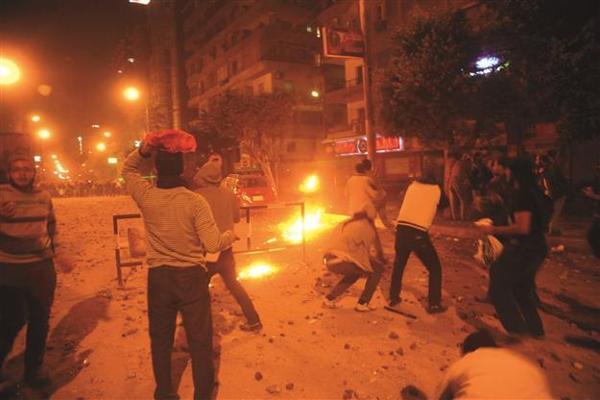Pressure mounts on Morsi amid clashes
CAIRO


Supporters and opponents of Egyptian President Mohamed Morsi engage in clashes in Cairo during protests staged around the Presidential Palace. AA photo
Egypt’s Republican Guard restored order around the presidential palace yesterday after fierce clashes overnight killed seven people, but passions remain high in a struggle over the country’s future.Hundreds of Morsi supporters who camped out near the palace the night of Dec. 5 withdrew before a mid-afternoon deadline set by the Republican Guard. Dozens of Morsi’s foes remained, but were kept away by a barbed wire barricade guarded by tanks.
The military played a large role in removing President Hosni Mubarak during last year’s popular revolt, taking over to manage a transitional period, but had stayed out of the latest crisis. Morsi’s supporters fought opposition protesters well into early yesterday during dueling demonstrations over the president’s Nov. 22 decree expanding his powers to help him push through the draft charter. Officials said seven people had been killed and 350 wounded in the Dec. 5 violence, for which each side blamed the other.
The overnight violence also spread beyond Cairo, with protesters torching Muslim Brotherhood offices in the Mediterranean port city of Ismailiya and in Suez. Six of the dead were Morsi supporters, according to the Muslim Brotherhood.
The commander of the Republican Guard said deployment of tanks and troop carriers around the presidential palace was intended to separate the adversaries, not to repress them. “The armed forces, and at the forefront of them the Republican Guard, will not be used as a tool to oppress demonstrators,” General Mohamed Zaki told the state news agency.
As chaos looms, Egypt’s top Islamic body called on President Morsi to suspend a decree in which he claimed sweeping powers and demanded an unconditional dialogue between the president and his opponents.
The Al-Azhar institution, the body in charge of handing down fatwas, said Morsi should “suspend the latest decree and stop using it,” in a statement a day after deadly protests between Morsi supporters and opponents.
Adding to the tension, state television head Essam al-Amir submitted his resignation to Information Minister Salah Abdel Maqsoud to protest “the way the country has been run since [the president] issued the recent constitutional declaration,” according to the Egypt Independent. Al-Amir said that the constitutional declaration divided the country.
Compounding Morsi’s woes, four of his advisers also resigned Dec. 5, joining the two other members of his 17-member advisory panel who have abandoned him since the crisis began.
